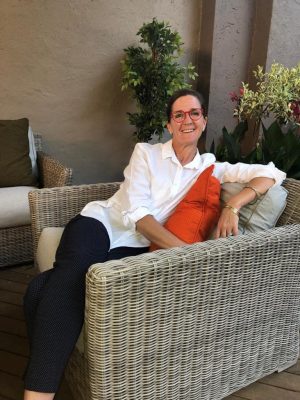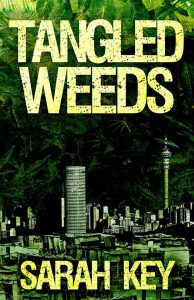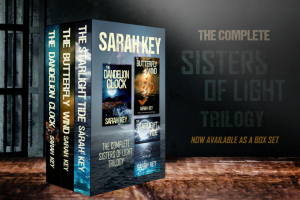
Getting a Thrill with Author Sarah Key
Gripping, gritty and grisly, that is how Psychological thriller author, Sarah Key‘s novels can be described. Known for her South African-based stories such as Tangled Weeds and The Sisters of Light Saga, her stories bring the diversity of South African culture to life through complex, memorable characters and thrilling storylines. To get your heart racing before her chats in the Books and Banter Theatre on Thursday, 28 February at 13:00 and Saturday, 2 March at 15:30, she kindly answered some introductory questions.
 How do you think your experiences as an educator and activist have influenced your writing?
How do you think your experiences as an educator and activist have influenced your writing?
I trained as an English teacher and have always loved literature and creative writing. I tried to enthuse my students and share my love of the language. I also taught academic writing, for a decade.
My work in multicultural arenas and in a national HIV/AIDS training initiative, allowed me valuable insights into different cultural perspectives. I drew on this, in my fictional works. I have always favoured an ethnological approach to research, asking people to describe experiences and trying to make sense of them through different lenses. These I feed into various characters.
When I wrote my first novel I was deeply concerned with various social issues – human trafficking, the AIDS pandemic, drug addiction, circumcision school, coming out (being able to follow one’s sexual orientation), street kids, incest, poverty. My editor groaned and asked if I could leave some of it out.
Writing was a way for me to process distressing sociological trends, and, by presenting them intertwined in a pacey tale, hopefully create awareness. My work in progress deals with trans-generational sex (blessers and blesses) and abuse.
What is the greatest challenge for South African writers? What has been your greatest challenge?
I think the challenges South African writers face are shared by all writers to some extent. Making money from writing is the first challenge. The old adage, ‘don’t give up you day job,’ is sound advice.
Publishing houses are under fiscal pressure. Getting books distributed and on shelves in bookshops may be prestigious but more people along the path take a cut. Authors are the ones who lose out. Marketing, advertising and pushing for reviews fall squarely on authors’ shoulders these days. Writers need to be able to navigate platforms such as Amazon and Kindle Direct Publishing and keep track of sales etc. Writing the book is the easy part.
In a technological world where screens offer lazy relaxation and escapism, cultivating and growing a readership is a challenge.
 Why did you choose the Psychological Thriller genre?
Why did you choose the Psychological Thriller genre?
I have always been intrigued by the aberrant human mind. As a child I grew up listening to Springbok Radio, ‘Squad Cars’ and the ‘Mind of Tracy Dark’. I read Edgar Allan Poe and Struwwelpeter when I was a tweeny so my preference for dark and edgy stories was established early.
Protagonists are generally quite boring. Virtuous people are not that useful to thrillers. Predatory, unsavoury villains are generally busy in the seedy underworld. They introduce energy and vigour.
Novels in the thriller genre should be electric and skillfully constructed to ensure that readers constantly feel the current and mounting voltage. The finale should pull-out-all-the-stops, forcing readers to hold their breath with heroes on seemingly impossible missions. This is why we love thrillers – they evoke suspense, excitement, speed and movement in a visceral, gut-churning way. We go along for the perilous, heart-stopping, nail-biting ride, but, luckily from the safety of our armchairs.


